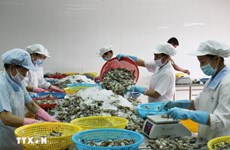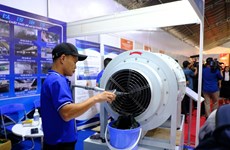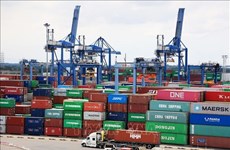Businesses urged to invest in supporting industries
A heavy dependence on imported materials has made Vietnamese
enterprises lose their competitive advantages and the development of
supporting industries is expected to be the key to the obstacle and to
enhance the competitiveness of businesses and the national economy, the
Nhan Dan (People) online newspaper has said.
A heavy dependence on imported materials has made Vietnamese
enterprises lose their competitive advantages and the development of
supporting industries is expected to be the key to the obstacle and to
enhance the competitiveness of businesses and the national economy, the
Nhan Dan (People) online newspaper has said.
The paper quoted Chairman of the Ho Chi Minh City Association of Garment Textile Embroidery and Knitting (Agtex) Pham Xuan Hong as saying that his company – the Saigon 3 Garment Joint Stock Company - has to import 70 percent of materials from foreign countries including 60 percent from the Chinese market with fabrics accounting for the most.
Nearly all domestic garment companies have to import a significant proportion of raw materials from abroad, which is due to the low production capacity of domestic firms in the field that results from undiversified categories of fabrics, limited supply of high-end goods and inflexible delivery times, he noted.
General Director Nguyen Chi Trung of Gia Dinh Shoes Co., Ltd. Shared Hong’s view, saying that almost all of footwear, garment and textile companies in Binh Duong province depend on materials supplies from abroad. Gia Dinh Shoes Co for example, has to import over 10 million USD of materials each year, with 80-90 percent from China.
"In fact, domestic suppliers can only offer simple materials and accessories with less diversified designs and lower quality than imported goods. Meanwhile, Chinese materials have reasonable prices, diversified categories, flexible payment schedules and quick delivery. If Vietnamese firms do not import materials, their leather and footwear products will have to compete fiercely with others because of high prices and an unstable source of supply", Trung said.
Similarly, Protrade Garment Co., Ltd. in Binh Duong province has to import around 40–50 million USD worth of fabrics each year, with 85 percent from China and the remainder from Japan.
But domestic industry is not alone. Foreign direct investment (FDI) firms encounter the same problem. For instance, Mei Sheng Textiles Vietnam Co., Ltd. in Ba Ria—Vung Tau province specialising in producing yarns, dyed yarns, dyed fabrics and knitted fabrics with an annual capacity of 50,000 tonnes has to import over 90 percent of materials from abroad.
It can be said that taking the initiative in materials and reducing the dependence on imported sources is an urgent need among Vietnamese enterprises. Despite the national trade surplus recorded in the last two years and a trade surplus of 1.6 billion USD in the first five months of this year, the result comes completely from the FDI sector. The domestic economic sector continues to move into trade deficit.
Experts said that enterprises are absolutely able to raise the localisation rate of their products, particularly products using popular materials and not requiring high technology. The question is whether domestic suppliers could meet the requirements of manufacturing enterprises or not.
According to Personnel Director Nguyen Hong Anh of Protrade Garment Co, there are several joint venture companies producing garment and textile materials at industrial zones in Binh Duong but they only produce simply categories such as zippers, labels and buttons with modest quantity and undiversified models.
Anh said that in the long term, the Government should encourage businesses to invest in this supporting industry by establishing industrial zones specialising in producing materials for garment and textile sector in a bid to reduce dependence on imported materials.
General Director Nguyen Chi Trung said that localities have focused on attracting investment at all costs for a long time, but have not always taken into account what they would provide for investors in such a value chain. Thus, for many years, the supporting industries of Vietnam have yet to develop but has mainly involved itself in processing and assembly and faced trade deficit.
To help enterprises ease the dependence on foreign markets, he recommended that the Government develop policies to support enterprises in the field, such as providing low interest rate loans in long time, tax and land lease incentives, free training for workers and so on.
Agtex Chairman Pham Xuan Hong also suggested the Government provide investment incentives for yarns, dyed fabrics and knitted fabrics industry to create a stable domestic supply.
The Government should actively invest in developing infrastructure for supporting industries instead of waiting for investment from enterprises. In addition, enterprises in this field need to connect with others to seek supplies and restrict the dependence on foreign markets, he said.
Only the strong development of supporting industries can help domestic enterprises take the initiative in input materials, limiting the dependence on imported sources and improving their competitiveness.-VNA
The paper quoted Chairman of the Ho Chi Minh City Association of Garment Textile Embroidery and Knitting (Agtex) Pham Xuan Hong as saying that his company – the Saigon 3 Garment Joint Stock Company - has to import 70 percent of materials from foreign countries including 60 percent from the Chinese market with fabrics accounting for the most.
Nearly all domestic garment companies have to import a significant proportion of raw materials from abroad, which is due to the low production capacity of domestic firms in the field that results from undiversified categories of fabrics, limited supply of high-end goods and inflexible delivery times, he noted.
General Director Nguyen Chi Trung of Gia Dinh Shoes Co., Ltd. Shared Hong’s view, saying that almost all of footwear, garment and textile companies in Binh Duong province depend on materials supplies from abroad. Gia Dinh Shoes Co for example, has to import over 10 million USD of materials each year, with 80-90 percent from China.
"In fact, domestic suppliers can only offer simple materials and accessories with less diversified designs and lower quality than imported goods. Meanwhile, Chinese materials have reasonable prices, diversified categories, flexible payment schedules and quick delivery. If Vietnamese firms do not import materials, their leather and footwear products will have to compete fiercely with others because of high prices and an unstable source of supply", Trung said.
Similarly, Protrade Garment Co., Ltd. in Binh Duong province has to import around 40–50 million USD worth of fabrics each year, with 85 percent from China and the remainder from Japan.
But domestic industry is not alone. Foreign direct investment (FDI) firms encounter the same problem. For instance, Mei Sheng Textiles Vietnam Co., Ltd. in Ba Ria—Vung Tau province specialising in producing yarns, dyed yarns, dyed fabrics and knitted fabrics with an annual capacity of 50,000 tonnes has to import over 90 percent of materials from abroad.
It can be said that taking the initiative in materials and reducing the dependence on imported sources is an urgent need among Vietnamese enterprises. Despite the national trade surplus recorded in the last two years and a trade surplus of 1.6 billion USD in the first five months of this year, the result comes completely from the FDI sector. The domestic economic sector continues to move into trade deficit.
Experts said that enterprises are absolutely able to raise the localisation rate of their products, particularly products using popular materials and not requiring high technology. The question is whether domestic suppliers could meet the requirements of manufacturing enterprises or not.
According to Personnel Director Nguyen Hong Anh of Protrade Garment Co, there are several joint venture companies producing garment and textile materials at industrial zones in Binh Duong but they only produce simply categories such as zippers, labels and buttons with modest quantity and undiversified models.
Anh said that in the long term, the Government should encourage businesses to invest in this supporting industry by establishing industrial zones specialising in producing materials for garment and textile sector in a bid to reduce dependence on imported materials.
General Director Nguyen Chi Trung said that localities have focused on attracting investment at all costs for a long time, but have not always taken into account what they would provide for investors in such a value chain. Thus, for many years, the supporting industries of Vietnam have yet to develop but has mainly involved itself in processing and assembly and faced trade deficit.
To help enterprises ease the dependence on foreign markets, he recommended that the Government develop policies to support enterprises in the field, such as providing low interest rate loans in long time, tax and land lease incentives, free training for workers and so on.
Agtex Chairman Pham Xuan Hong also suggested the Government provide investment incentives for yarns, dyed fabrics and knitted fabrics industry to create a stable domestic supply.
The Government should actively invest in developing infrastructure for supporting industries instead of waiting for investment from enterprises. In addition, enterprises in this field need to connect with others to seek supplies and restrict the dependence on foreign markets, he said.
Only the strong development of supporting industries can help domestic enterprises take the initiative in input materials, limiting the dependence on imported sources and improving their competitiveness.-VNA













